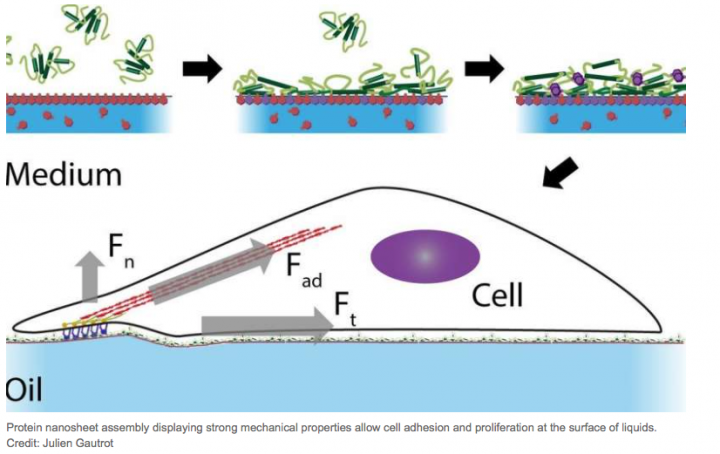 Cells 'walk' on liquids a bit like geckos
Cells 'walk' on liquids a bit like geckos
Researchers at Queen Mary University of London have discovered that cells can 'walk' on liquids a bit like the way geckos stick to other surfaces.
Cells are typically grown on solid materials, such as tissue culture plastic, degradable polymers and bioceramics. It is thought that the strong mechanical properties of these biomaterials are required to allow cell adhesion, an important process often controlling the behaviour of stem cells and promoting implant incorporation by surrounding tissues and tissue regeneration.
In this study, published in Nano Letters, the researchers report the successful growth of skin cells at the surface of liquid oil droplets.
This is surprising as the low viscosity of liquids is not thought to support the mechanical forces generated by cells during their adhesion.
The research team discovered that protein nanosheets, films only a few nanometres thick, assemble at the surface of such liquids and display strong mechanical properties sufficient to resist cell-generated forces.
By combining different types of mechanical characterisation methods at the nanoscale, they propose that cell adhesion to such liquids is not mediated by surface tension, as in the case of the walking of water striders, but more akin to the adhesion of geckos to a wide range of surfaces, in which shear forces play an important role.
Read more at: https://phys.org/news/2018-02-cells-liquids-bit-geckos.html#jCp
Cells are typically grown on solid materials, such as tissue culture plastic, degradable polymers and bioceramics. It is thought that the strong mechanical properties of these biomaterials are required to allow cell adhesion, an important process often controlling the behaviour of stem cells and promoting implant incorporation by surrounding tissues and tissue regeneration.
In this study, published in Nano Letters, the researchers report the successful growth of skin cells at the surface of liquid oil droplets.
This is surprising as the low viscosity of liquids is not thought to support the mechanical forces generated by cells during their adhesion.
The research team discovered that protein nanosheets, films only a few nanometres thick, assemble at the surface of such liquids and display strong mechanical properties sufficient to resist cell-generated forces.
By combining different types of mechanical characterisation methods at the nanoscale, they propose that cell adhesion to such liquids is not mediated by surface tension, as in the case of the walking of water striders, but more akin to the adhesion of geckos to a wide range of surfaces, in which shear forces play an important role.
Read more at: https://phys.org/news/2018-02-cells-liquids-bit-geckos.html#jCp


